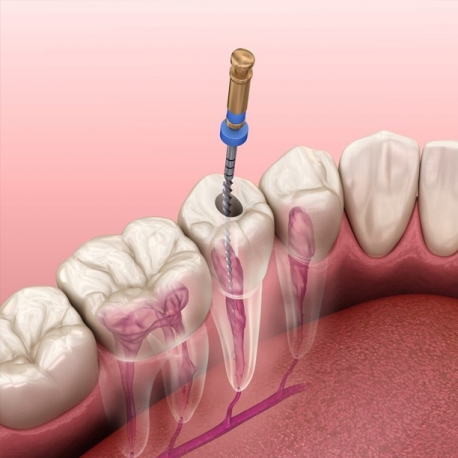Endodontics (Canal Treatment)

Root canal treatment (Endodontics) is the branch of science in which root canal treatments are carried out. Today, root canal treatment is performed in a single session in live teeth and in two sessions in teeth that have lost their vitality.
About Dental Anatomy
The part of the tooth that is visible in the mouth is called the crown, and the part that is not visible in the mouth is called the root. Our teeth are made up of several layers. The outermost part of the crown, that is, the part that is seen in our mouth is called enamel. The cement layer covers the root part of our tooth, which is under the gingiva and surrounded by bone. There is also the dentin layer under the tooth enamel and cement layers. Dentin is the largest layer of the tooth and, unlike the enamel layer, it contains nerve endings. With this feature, it plays a role in the pain mechanism.
Under the dentin layer is the dental pulp. In this part, there are vessels and nerves of the tooth. The pulp plays an important role during the eruption and development of the tooth. In addition, after tooth eruption, it informs us about the pain mechanism and the problems our teeth encounter.
How is the pulp inflamed?
Every person has bacteria in their oral cavity. Bacteria combine with many of the foods we eat and cause acids to form in our mouths. If we cannot remove these formed acids from our mouth, these substances damage the enamel and cause cavities in the enamel layer. If the bruises in the enamel are not treated, they pass into the dentin layer under the enamel layer. Although the dentin layer warns us with pain, if the caries formed is not treated again, this time the microorganisms move towards the pulp. Meanwhile, the pulp engages in various ways to protect itself. One of these ways is to warn us through pain.
Another way in which inflammation can occur in the pulp is trauma. A blow to the tooth may cause rupture of the vessels and nerves entering the root of the tooth from the root tip, thus causing the tooth to lose its vitality. In this case, the addition of microorganisms by any means causes inflammation of the pulp. Another way the pulp can become infected is the presence of long-term periodontal (gum and surrounding) disease around the tooth.
How To Tell If A Tooth Is Infected?
Toothache and tooth sensitivity during cold and hot food consumption can be a sign of inflammation. Excessive discoloration of the teeth can also be included in these signs of inflammation. Apart from these, in untreated teeth where the decay reaches the pulp, the infection goes from the root tip to the jawbone and may cause small or large swellings on the face. In this case, the fight against infection, the use of antibiotics as well as the procedures performed by the dentist can be applied. The general belief is that the tooth that causes swelling on the face should be removed after the swelling goes down, but this is a very old idea. At this point, even the teeth that cause infections can be kept in the mouth by root canal treatment and this tooth can serve you for years like a healthy tooth.
What Are the Stages of Root Canal Treatment?
Identification of the problematic tooth by taking radiography.
If the tooth is alive, local anesthesia is used to destroy the sensitivity of the tooth and surrounding tissues.
Cleaning the caries in the enamel and dentin layers of the tooth and creating the space to reach the pulp.
Determination of working length using electronic instruments and confirmation by radiography.
Destruction and removal of infected dentin layers and microorganisms in the root canal using rotary instrument systems.
Destruction of microorganisms with various root canal disinfectants when using rotary instrument systems in root canals.
If the tooth is not alive when starting the root canal treatment, waiting for a certain time with a canal antiseptic to be placed in the root canal and filling the root blood at the next meeting.
After the root canal treatment, it is aimed to cut the relationship of the tooth with the surrounding tissues, so that the infection does not occur again and if there is any damage to the surrounding tissues of the tooth, it is aimed to be repaired.
Today, the success rate of root canal treatments, where the right treatment method is applied, reaches 90%.
